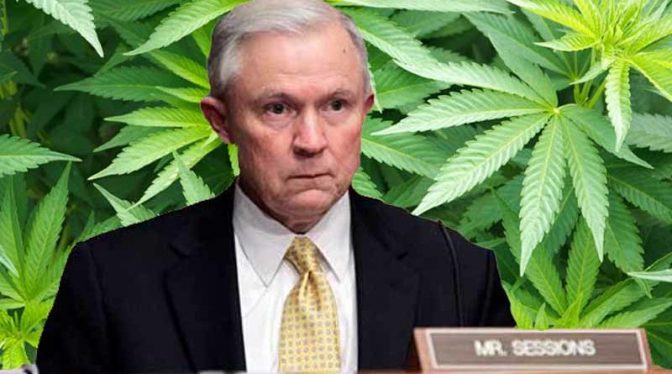Cannabis Confusion: Federal Style

One can only imagine the collectively held breath of the thousands of cannabis-related companies, tens of thousands of cannabis industry employees and millions of cannabis consumers during this week’s Attorney General nomination hearings of Sen. Jeff Sessions (R-AL) at the Capitol in Washington, D.C.
Sen. Sessions, a former prosecutor and longtime culture warrior, has vehemently opposed any measure of cannabis law reform no matter how slight during his three terms in the Senate dating back to 1995. He’s especially noted for:
• Publicly saying that he didn’t have a problem with the KKK per se, until he discovered that some of their members smoke cannabis.
• Telling an open Senate hearing that “good people don’t smoke marijuana.”
• Openly criticizing the Obama administration for failing to enforce federal anti-cannabis laws in states that have duly opted for more liberal cannabis policies
During the hearings, two senators raised the marijuana issue as it pertains to the Department of Justice. Sen. Patrick Leahy (D–VT), who hails from a state that legalized medical access to cannabis more than a decade ago, decriminalized adult possession and came with in a few votes last year of becoming the first state in the union to legalize cannabis via legislation rather than by a ballot initiative, was the first member of the Senate Judiciary Committee to mention marijuana in the hearing. Here’s how the exchange went:
Sen. Leahy: “Would you use our federal resources to investigate and prosecute sick people using who are marijuana in accordance with state law seven though it might violate federal law?”
Sen. Sessions: “I won’t commit to never enforcing federal law, Sen. Leahy, but absolutely it’s a problem of resources for the federal government. The Department of Justice under [Loretta] Lynch and [Eric] Holder set forth some policies that they thought were appropriate to define what cases should be prosecuted in states that have legalized, at least in some fashion marijuana, some parts of marijuana.”
Sen. Leahy: “Do you agree with those guidelines?”
Sen. Sessions: “I think some of them are truly valuable in evaluating cases, but fundamentally the criticism I think that was legitimate is that they may not have been followed. Using good judgment about how to handle these cases will be a responsibility of mine. I know it won’t be an easy decision, but I will try to do my duty in a fair and just way.”
Sen. Leahy: “The reason I mention this, is because you have some very strong views, you even mandated the death penalty for anyone convicted of second offense on drug trafficking, including marijuana, even though mandatory death penalties are of course unconstitutional.”
Sen. Sessions: “Well I’m not sure under what circumstances I said that, but I don’t think it sounds like something I would normally say.”
Sen. Leahy: “Would you say it’s not your view today?”
Sen. Sessions: “It is not my view today.”
Sen. Mike Lee (R-UT) followed up this question: “You have an interesting set of circumstances with our controlled substances laws concerning marijuana. For the first time in a very long time, you’ve seen some attention paid to federalism, but in a limited area associated with marijuana. There are federal laws prohibiting the use of marijuana, the sale of marijuana and the production of marijuana that apply regardless of whether a state has independently criminalized that drug, as every state until recently had. Then you had some states coming along and decriminalizing it sometimes in the medical context, other times in a broader context. The response by the Department of Justice during he Obama administration has been interesting. It’s been slow to recognize principles of federalism elsewhere, but they chose to recognize it here. My question to you is the way they did respond to that federalism concern run afoul of separation of powers. Can the department’s approach to this issue be identified as a federalism issue?
Sen. Sessions: “I’m not sure I fully understand the point of the question. You’re talking about separations of powers within the federal government, right? The three branches of federal government?
Sen. Lee: “Yes.”
Sen. Sessions: “And how does that implicate the marijuana laws?”
Sen. Lee: “Yes. Are their separation of powers concerns arising out of the Department of Justice’s current approach to state marijuana laws?”
Sen. Sessions: “I think one obvious concern is the United States Congress has made the possession of marijuana in every state and distribution of it an illegal act. If that’s something that’s not desired any longer, Congress should pass a law to change the rule. It’s not so much the Attorney General’s job to decide what laws to enforce. We should do our job and enforce laws effectively where we’re able.”
By putting the onus back on Congress to update cannabis laws, Sen. Sessions proved to be no more or less radical or inflexible than Obama’s first AG, Eric Holder, who, when asked by inquiring senators during his 2009 confirmation hearings about the then ever-increasing number of states with medical access laws for cannabis, chose to kick the issue to Congress as well.
The soon-to-be-announced nominees for the heads of the DEA and Office of National Drug Control Policy (ONDCP), for whom Sessions as AG will surely have a huge hand in picking, these two political appointments will provide even more telling information about a Trump/Sessions national cannabis policy. The incoming Trump Administration also has other crucially important personnel decisions pending that will directly impact federal cannabis policy, including the heads NIDA, the FDA and the Substance Abuse and Mental Health Services Administration (SAMHSA).
However, a big difference between the national cannabis policies that Obama/Holder inherited from the Arrest-and-Lock-Them-Up George W. Bush administration compared to Trump and Company is that in 2009 no state had yet to create a legal access policy for even medical cannabis. Soon after Obama/Holder took office the state legislatures of first New Mexico and then, more importantly, Colorado effectively ended cannabis prohibition writ large by passing legislation that created licensed, regulated and taxed cannabis commerce (for medical patients who possessed a physician’s recommendation).
Currently, 29 states have passed legislation or voter initiatives allowing medical access to cannabis; 16 states and the District of Columbia have decriminalized adult possession and, most crucially, eight states have outright legalized cannabis to be sold and taxed similarly to alcohol and tobacco products (the voters in the nation-state of California chose the free over black market to better control cannabis by passing Prop 64 on Nov. 8).
Trump and Sessions are inheriting an entirely different and more diffused federal cannabis policy under Obama/Holder (and later AG Loretta Lynch) that has allowed states and municipalities to collect well over a billion dollars annually in cannabis-related licenses, fees and taxes.
If Trump and Sessions want to return the federal government to fecklessly enforced and unpopular anti-cannabis policies, they will do so under direct threat from the states that have legalized cannabis, who favor their ability to both assert autonomy under federalism and collect revenue from a form of commerce popularly approved by either voters or elected policy makers.
Trump’s choice of Sen. Jeff Sessions, and those that end up with these other important positions, will be the first real indicators of whether or not the Feds’ long-failed cannabis policy of prohibition has in fact ended in America or whether Trump/Sessions want to re-embrace Reefer Madness.
The best ways to help lobby the incoming Trump administration and Congress in favor of allowing states to continue steering away from pot prohibition are:
• Contact your elected members of Congress and Senate informing them of your strong support for ending federal cannabis prohibition and of allowing states continued autonomy to legalize and tax cannabis commerce.
• Join and support cannabis law reform organizations such as NORML, DPA, NCIA, MPP, ASA and SSDP.
If you enjoyed this Freedom Leaf article, subscribe to the magazine today!

